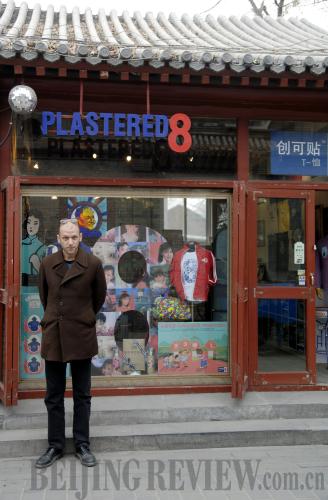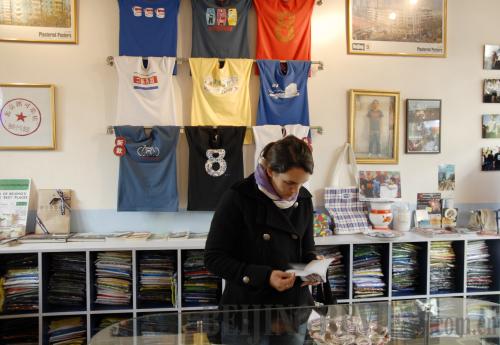|
 |
|
HE HAS IDEAS: Dominic Johnson-Hill, the founder of Beijing's Plastered 8, stands before one of his two stores on Nanluoguxiang Alley, December 1, 2009 (JING XIAOLEI) |
Several foreign tourists entered the small clothing shop called Plastered 8 on Beijing's Nanluoguxiang Alley, drawn in by the store's unusual name.
"I didn't know this shop before, but I came in because I think its name is funny. Plastered means drunk!" said a female tourist from New Zealand. Her group spent 108 yuan ($15.8) on a blue T-shirt with a yellow carp on it. They picked it from many others that were decorated with different signs and symbols.
"I like the one with the yellow fish just because we do a lot of fishing back home in New Zealand," she said. Had she looked further, she would have come to understand that the carp symbolizes wealth and abundance in Chinese culture.
The use of those types of symbols have brought attention to both the shop and its founder, Dominic Johnson-Hill, a British man who has spent almost half of his 37 years in Beijing. Plastered 8, a brand that he created in 2005, sells high quality and creative T-shirts and other products including bags, ashtrays, calendars, posters and framed badges that are inspired by daily Chinese life.
The scenes on the clothes range from the famous Chinese dish Kung Pao Chicken to old subway tickets, thermos bottles, once popular revolutionary-era slogans and phrases that have caught on in recent years in China. The brand has become popular and has made its way onto many must-visit shop lists in Beijing over the last four years of growth. The T-shirts are now sold in other Chinese cities and overseas.
Creation dictator
Johnson-Hill's business card surprises those who see his title on it—Creation Dictator.
"I'm the kind of guy who always has lot of strange ideas, and I do want to bring them into reality," he said.
In 1993 he came to China to stay with his brother, who was working for a company in the coastal city of Qingdao, Shandong Province. Finding nothing to do there, he borrowed $200 from his brother and traveled north to the capital.
"Life wasn't easy at first for me in Beijing as the city had many restrictions on foreigners at that time. We had to live in certain areas and we could only buy things with foreign currency," he said.
Seven years ago he moved to Nanluo-guxiang Alley, an ancient street with 700 years of history. In 2005, he learned that the alley was included in the city's planning scheme and he thought there might be an opportunity for him. He rented a small place nearby but did not yet have a clue what he would fill it with, until he came up with the idea of selling T-shirts with interesting signs on them.
"T-shirts with signs are always popular in the Western world. Why shouldn't they be popular here in China, as well?" He said.
He began taking pictures of all kinds of things that he thought represented Beijing—transit and food tickets, Beijing taxi receipts and porcelain water cups. He then asked a designer to put the pictures onto T-shirts.
The first T-shirt he made was one that included the Great Wall, a standard for the city's tourist shops, but also included a beauty clad in a bikini that accompanied the iconic image. Fun, humor and surprises can often be found on his designs. He has made T-shirts with Chairman Mao and the classic words "Serve the People," but below those he added his cell phone number.
In the beginning, the majority of customers coming to his shop were foreigners. In recent years, however, the percentage of foreign buyers has dropped sharply and the number of Chinese shoppers has increased. Johnson-Hill thinks Chinese consumers like his goods because they normally go to extremes when they shop—either they buy luxurious brands or cheap and low-quality ones. His products are between those poles.
"We pay attention to the quality of our clothing. We have changed five to six factories to manufacture clothes for us as we have high quality standards," he said.
Plastered 8's clothing and other products are mostly in the retro style. But the founder, who says he does not know much about painting or designing, keeps the new ideas coming by introducing contemporary ingredients. He has just finished a new work of art, a portrait of former Chinese leader Deng Xiaoping made using colored glass.
"I was inspired by my childhood experience when I used to go to church, but I had no interest in listening. I just observed the church windows, which were made out of colorful glass."
Johnson-Hill confessed he is a good creator but a poor manager. For this reason, he has decided to hire someone to manage the business, which now includes a second store on another small and ancient cultural alley in Beijing called Yandaixiejie.
"I want 100-percent control of my brand. There have been investors coming to me who want to join, but I have refused," he said.
The culture promoter
 |
|
COOL T-SHIRTS: A foreign customer on December 1 shops at Plastered 8, a store that features original T-shirts with interesting art related to all aspects of Chinese culture, on Beijing's Nanluoguxiang Alley (JING XIAOLEI) |
Johnson-Hill has played an important role in promoting the city's design, porcelain and traditional folk arts. He organized the area's first hutong (meaning alley) fashion show to help promote his T-shirts. His move attracted the attention of district administrators, who began to form a strong relationship to cooperate with him to promote the whole area's culture. The clothing shop was the first on Nanluoguxiang Alley, which made Time magazine's List of 25 Authentic Asian Experiences in 2009.
In 2007, he proposed the first hutong culture festival and was supported by district administrators. The event, featuring local designs and live music, was a big success and turned the international spotlight on Nanluoguxiang.
Over the next two years, Johnson-Hill became one of the area's chief promoters and helped to bring Nanluoguxiang's creations to the Beijing International Cultural and Creative Expo. During this year's event, held on November 26-29, he gave a lecture on the hutong's recent history and its affect on Plastered 8.
He said for 2009 he is most proud of the September rock concerts he produced with local record label Maybe Mars, titled Plastered Rock Weekend. The event was aimed at discovering the next generation of Chinese rock bands.
Johnson-Hill's affection for Chinese rock and folk music dates back to 1995, when he saw a concert at a French school in Beijing.
"At that time it was not easy to go to a rock music performance in China. I saw many influential rock icons like the band Black Leopard and the singer Cui Jian," he said.
He has loved Chinese rock music ever since and has developed friendships with several musicians. In 2008, he decided to sponsor a local music website called buchadian.com, which helps discover fresh sounds from new musicians. Music also inspired his idea to make T-shirts that feature rock bands and artists.
"China has many great rock bands, but most have financial problems that hamper their development. I want to do something to help," he said.
As a creative man, Johnson-Hill thinks Beijing is the perfect place to carry out his creations.
"Beijing is the city that I love most in China because it's always changing and giving rise to so many new ideas. That's really exciting," he said. "You don't have to be rich to start creating things here. Chinese people with all kinds of materials and skills can make almost everything, and without much cost at all." | 